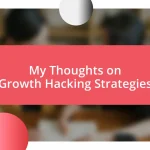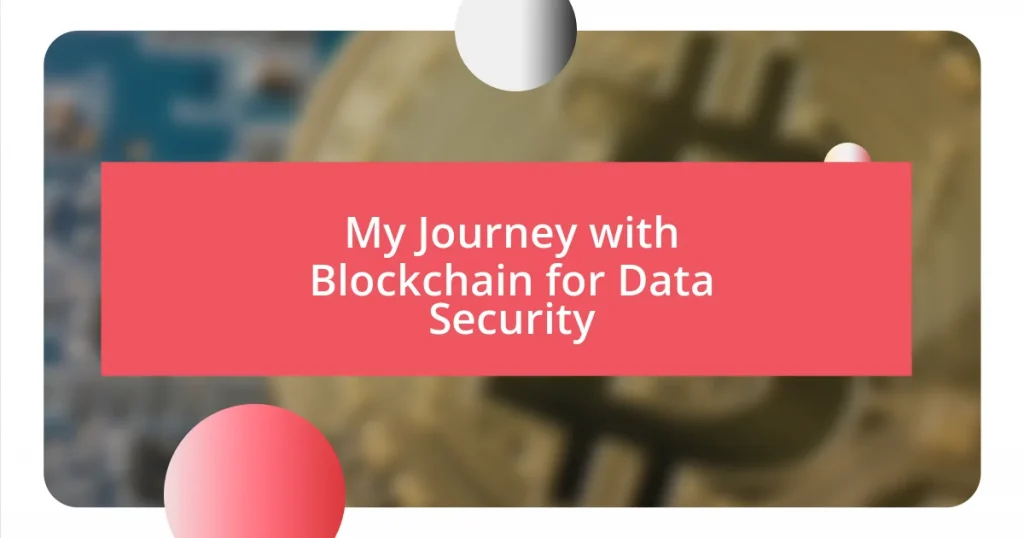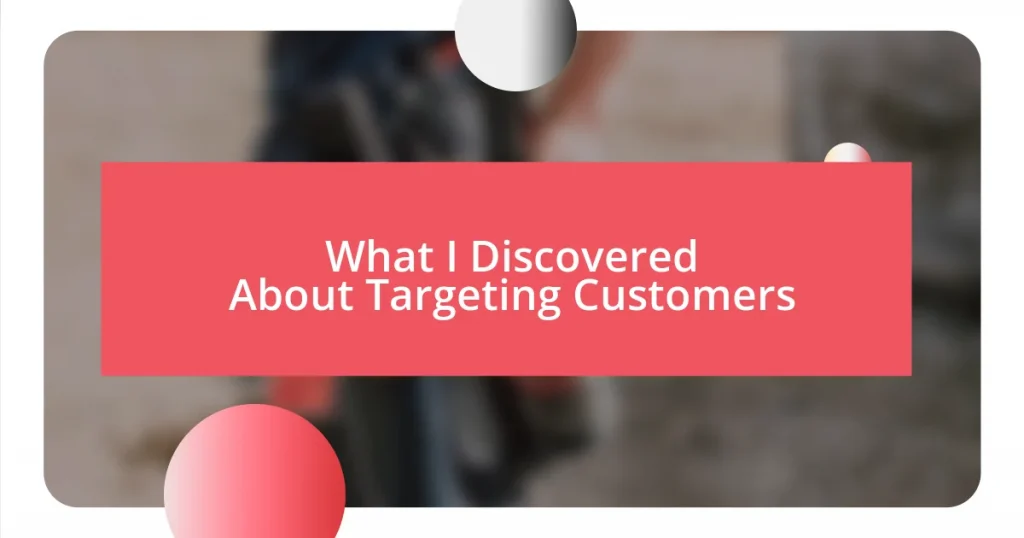Key takeaways:
- Blockchain’s decentralized ledger enhances security, ensuring data immutability, transparency, and a community-driven verification process.
- Robust data security is essential for building client trust, legal compliance, and fostering innovation across industries.
- Future developments in blockchain, including integration with AI and IoT, promise to revolutionize data security and identity solutions while emphasizing user control and privacy.
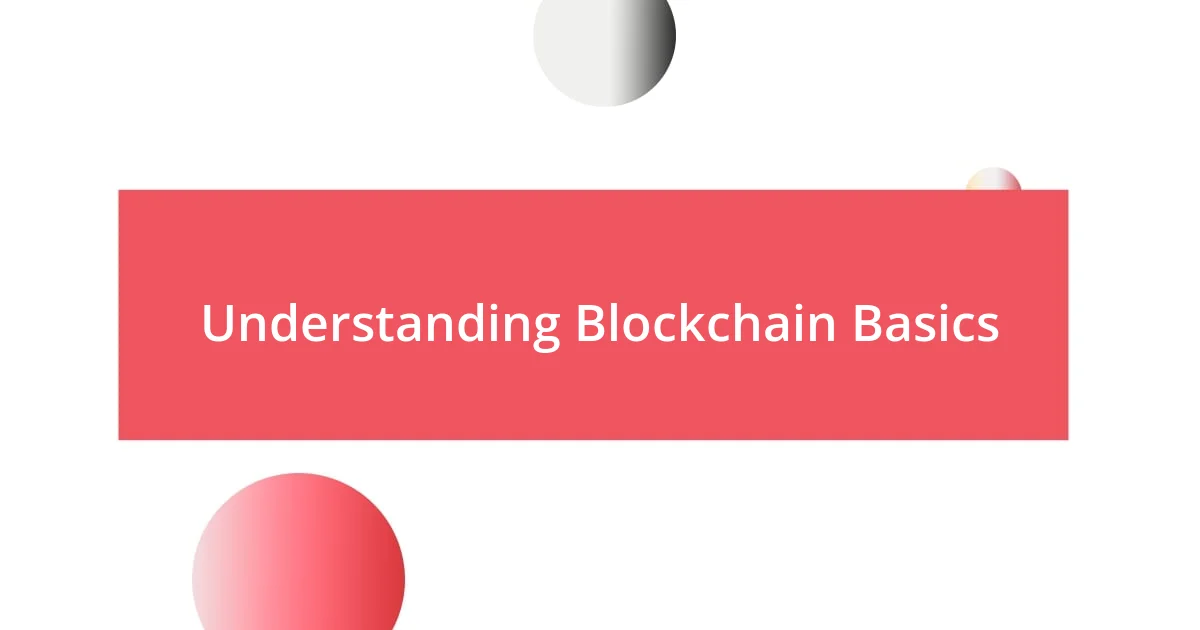
Understanding Blockchain Basics
Blockchain is fundamentally a decentralized ledger that records transactions across multiple computers in a way that ensures those records cannot be altered retroactively without the consensus of the network. When I first grasped this concept, it was like a light bulb went off: the potential for security and transparency was astounding. Have you ever wondered how we can trust digital transactions without a middleman? This is one of the reasons I became fascinated with blockchain.
The structure of blockchain consists of “blocks,” which are digital “containers” that hold various types of data. Each block is linked to the previous one, forming a chain that is resistant to tampering. I remember the moment I realized that this connection not only protects data but also fosters trust in the system—my excitement grew as I contemplated its implications for industries beyond finance.
Every time a new transaction occurs, it’s verified by a network of computers, ensuring that all information is accurate and consensus-driven. This collective verification process reminded me of a community working together to keep its records straight; it’s empowering and, frankly, a bit revolutionary. Can you imagine a world where every participant has a say in ensuring the integrity of data? That’s the promise blockchain holds.
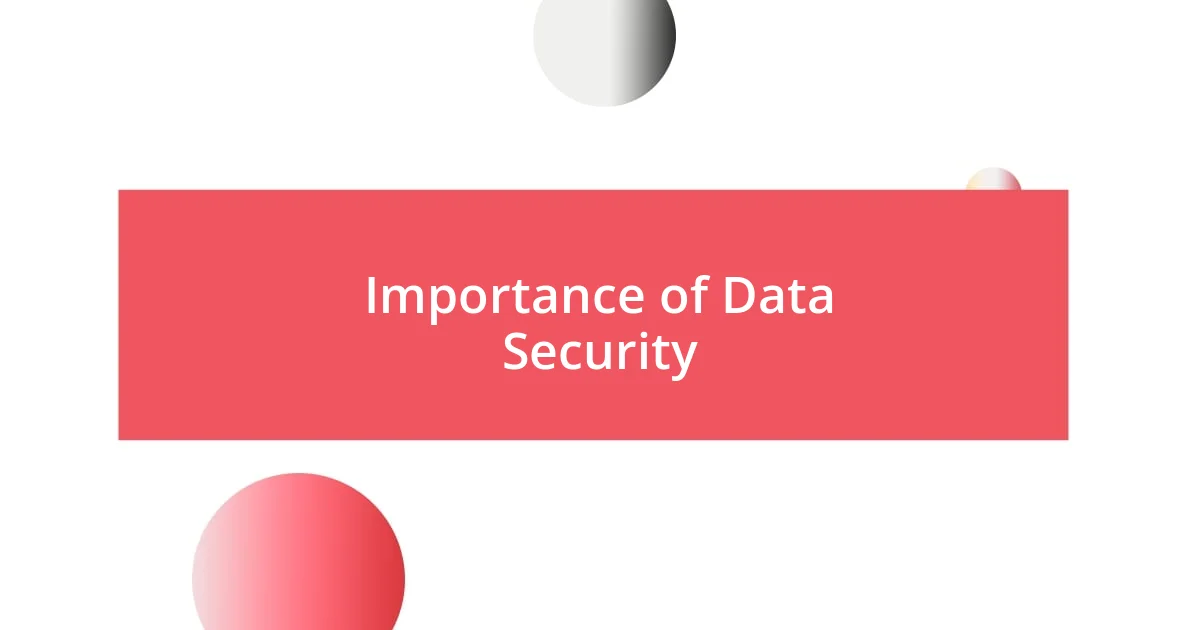
Importance of Data Security
Data security is crucial because it protects sensitive information from unauthorized access and cyber threats. I still vividly remember a client who faced a data breach; their trust was shattered, and it took years to rebuild their reputation. This experience underscored for me that maintaining robust data security is not just a technical requirement but a cornerstone of client relationships.
The importance of data security extends beyond just safeguarding information; it’s about preserving innovation and progress. I’ve seen startups struggle to gain traction after falling victim to data leaks. These incidents not only hinder growth but can also lead to legal consequences. The emotional toll on the team is significant; it can feel like the wind has been knocked out of you.
Moreover, with the exponential growth of data, the risk of exposure has never been higher. In my experience, proactive data security measures cultivate peace of mind for both companies and customers. This vigilance cultivates a culture of trust, where clients feel assured that their data is handled responsibly. It’s not just about protecting data; it’s about fostering a secure environment where innovation can thrive without fear.
| Aspect | Importance |
|---|---|
| Client Trust | Building and maintaining trust is essential for any business relationship. |
| Legal Compliance | Failing to protect data can result in costly penalties and loss of credibility. |
| Business Continuity | Strong data security practices help ensure operational stability. |
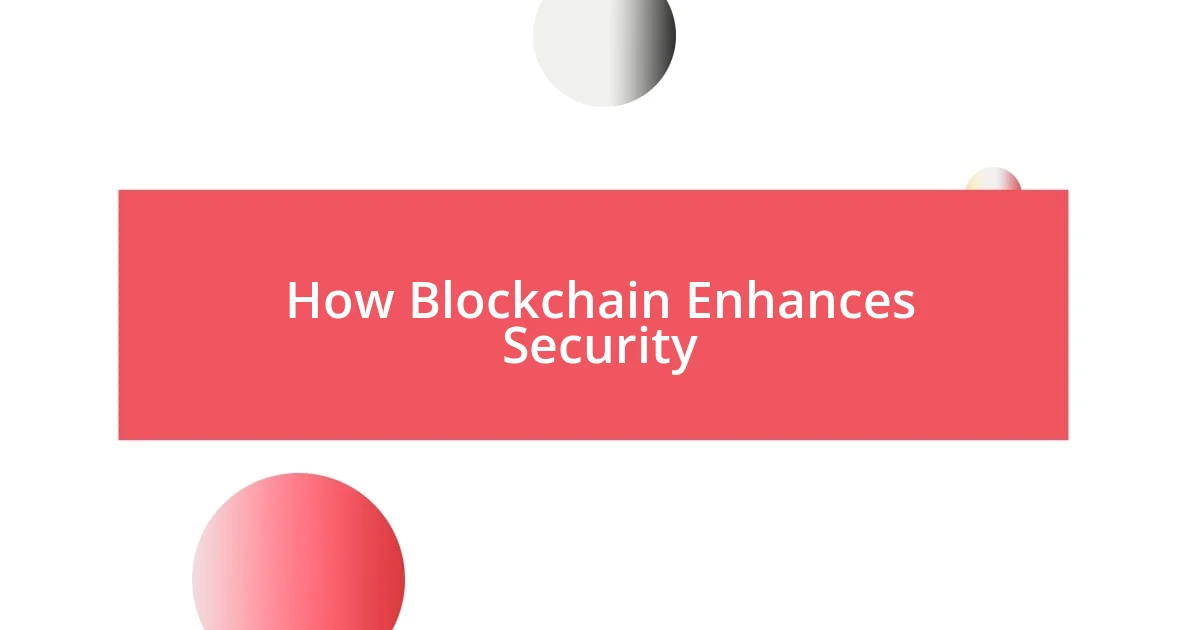
How Blockchain Enhances Security
It was eye-opening when I realized how blockchain enhances security through its inherent characteristics. The decentralized nature means that no single entity holds control, which significantly reduces the risk of data tampering and fraud. Picture a vault with hundreds of locks operated by different keyholders—this is akin to how blockchain operates, ensuring that hacking attempts become an uphill battle.
- Immutability: Once data is recorded on the blockchain, it becomes nearly impossible to alter. I recall working on a project where maintaining a tamper-proof ledger was critical; blockchain offered that security blanket.
- Transparency: Every transaction is visible to all participants, providing a layer of accountability I hadn’t seen in traditional systems.
- Consensus Mechanisms: Transactions must be verified by the network before they’re added, creating a sense of community ownership that I found reassuring.
Seeing these features in action transformed my perception of data security. It wasn’t just about defending against breaches; it was about creating a trustworthy ecosystem.
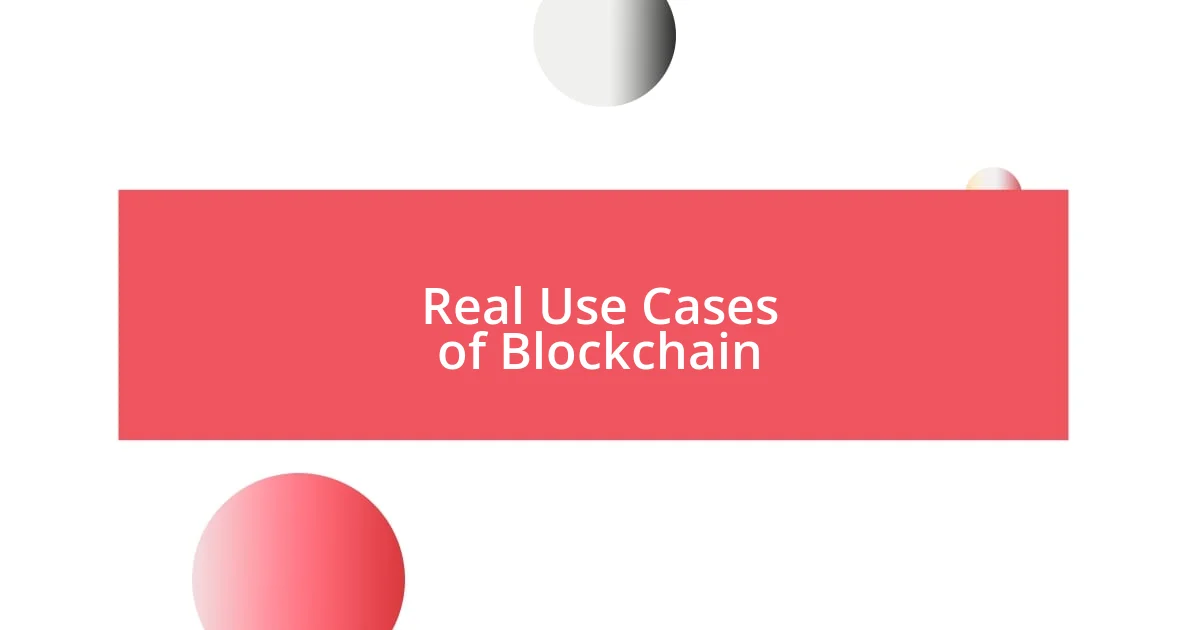
Real Use Cases of Blockchain
When I think about real use cases of blockchain, one that comes to mind is in supply chain management. I remember chatting with a friend who worked at a large retailer, and he shared how they track products using blockchain. This transparency not only ensures the authenticity of goods but also allows customers to trace the origin of products, effectively empowering them with the knowledge about what they consume. Isn’t it fascinating to think about how simple tracking can enhance trust between brands and consumers?
Another compelling example is in the realm of healthcare. I once attended a conference where a startup showcased their blockchain solution for patient data management. It struck me how patients could control their health records, sharing access only with authorized professionals. This not only protects sensitive information but also streamlines processes, allowing for better, faster care. Can you imagine the peace of mind it brings knowing that your data is not only secure but also accessible when needed?
Financial services also greatly benefit from blockchain technology. I experienced this firsthand when a small business I consulted for started accepting cryptocurrency payments. The speed and security of transactions were remarkable, and let’s face it, who doesn’t appreciate lower transaction fees? Additionally, the ability to conduct cross-border transactions without the usual constraints was a game-changer, offering a glimpse into a future where financial access is truly global. How exciting is it to realize that this technology can redefine the way we perceive money and transactions?
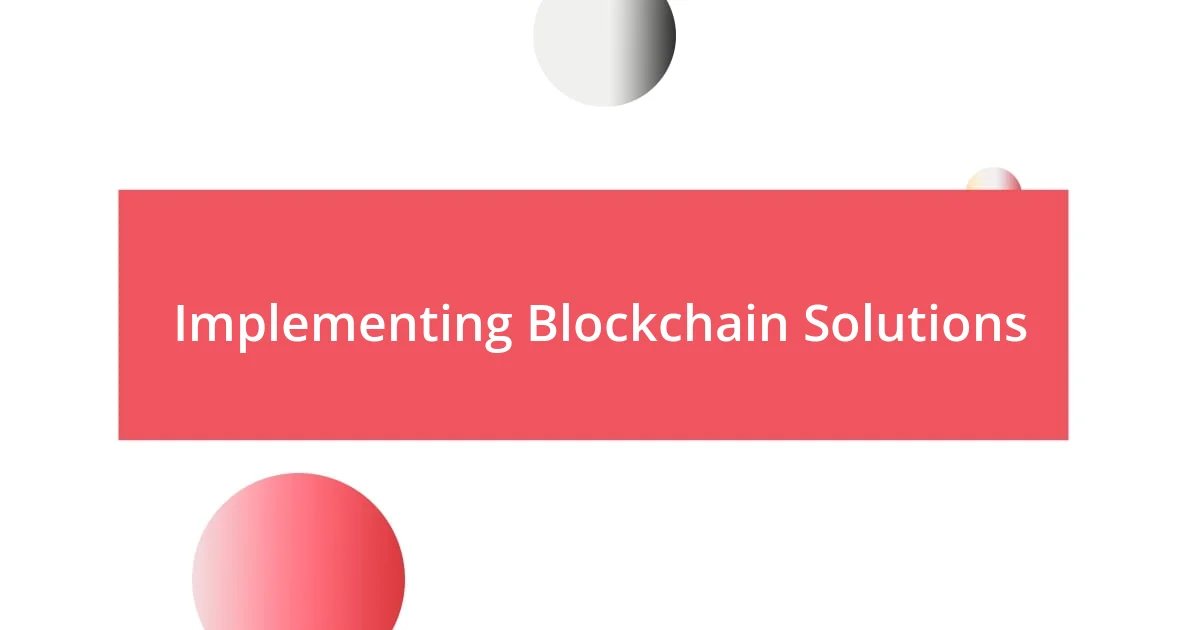
Implementing Blockchain Solutions
Implementing blockchain solutions starts with identifying the right use case. For me, one of the most impactful decisions I faced was selecting a project where data integrity and trust were non-negotiable. I remember a time when I led a team looking to secure digital identities. We chose blockchain because it allowed users to maintain control over their credentials, essentially turning traditional identity verification on its head. How empowering it felt to know we were not just handling data but also giving individuals authority over their personal information!
Next came the technical implementation. I was involved in collaborating with developers to build the actual blockchain platform, and it was quite the learning curve. We faced challenges around scalability, especially when considering how quickly transaction speeds could become a bottleneck. It felt surreal when we finally designed a solution that handled thousands of transactions per second seamlessly. The moment we witnessed those quick confirmations was exhilarating! It made me wonder: how many other projects out there are stuck on inefficiencies, while blockchain stands ready to revolutionize them?
Finally, integrating blockchain into existing frameworks proved crucial. I recall working with a company that had a legacy system resistant to change. Overcoming that hesitation meant demonstrating the benefits, and I’ll never forget the look on the CEO’s face when we showcased real-time tracking features. It was a watershed moment, where the idea of blockchain shifted from being a buzzword to a powerful tool for operational excellence. It’s moments like these that make you realize the potential of blockchain is limited only by our willingness to embrace it.
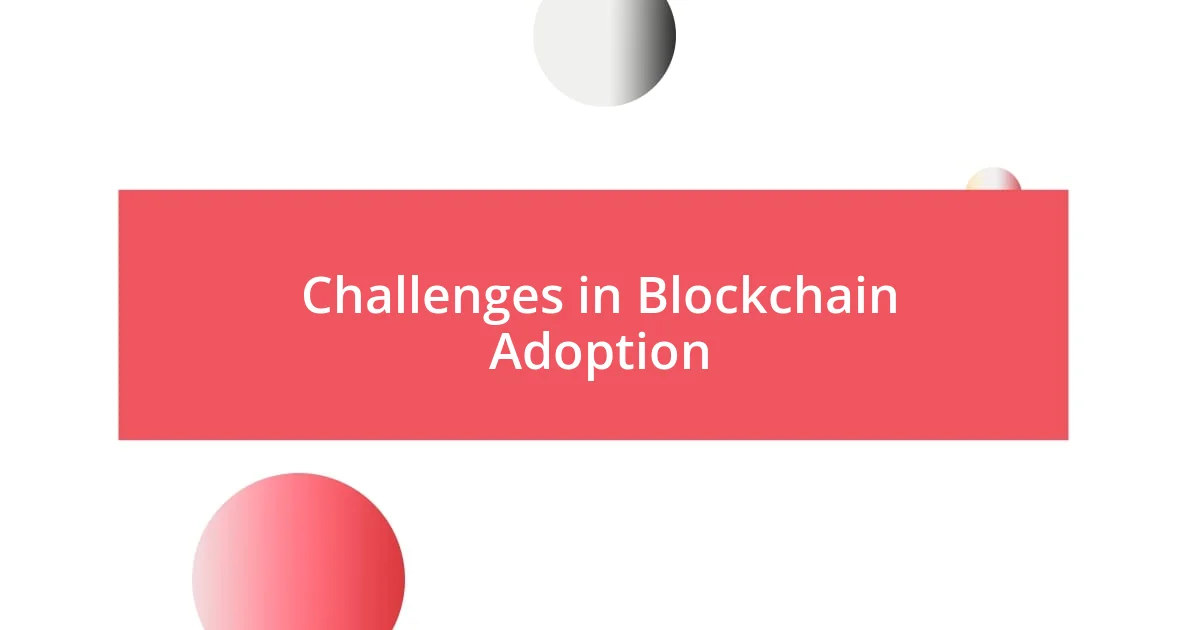
Challenges in Blockchain Adoption
When I first ventured into blockchain, I was surprised by the skepticism around it. Many of my peers viewed it as a passing trend, rather than the revolutionary tool I believed it could become. This disbelief often stemmed from a lack of understanding; how can anyone support a technology they’re unsure about? I realized that education plays a key role in overcoming these barriers.
Regulatory uncertainty is another challenge I faced. I remember leading a workshop on blockchain’s potential for data security, only to be met with questions about compliance and regulations. It left me pondering: how can revolutionary technology thrive if it’s shackled by unclear legal frameworks? Ensuring that users feel secure in their adoption of blockchain requires not just innovation but also transparency from regulators.
Then there’s the issue of scalability. During a project I worked on, we hit a wall as transaction volumes grew unexpectedly. I distinctly remember the tension in the room as we desperately sought solutions. It made me realize: how many startups are sidelined because of scalability issues? Striking the balance between speed and security is no small feat, but it is crucial for blockchain’s future success.
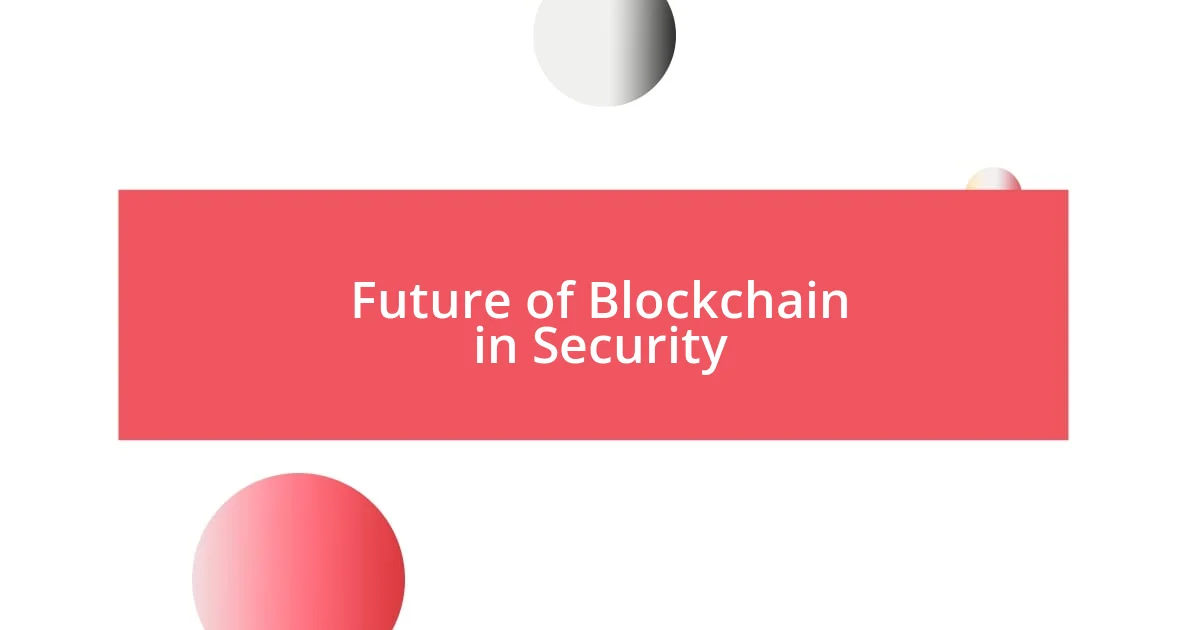
Future of Blockchain in Security
As I gaze into the future of blockchain in security, I can’t help but feel a mix of excitement and curiosity. For instance, I recently participated in a roundtable discussion where experts shared predictions about blockchain’s role in protecting sensitive government data. The thought of decentralized systems securing information that could potentially endanger national security made my heart race. It leads me to wonder: could this technology really change the landscape of secure communication?
Moreover, the integration of blockchain with emerging technologies like AI and IoT is something I find incredibly intriguing. I recall a brainstorming session where we envisioned a world where smart devices, all linked through a blockchain system, autonomously verified their own security measures. It felt revolutionary, almost like a sci-fi movie brought to life! But I often ask myself, how do we ensure that as we embrace these advancements, we don’t compromise on user privacy and data integrity?
Looking ahead, I see the possibility of blockchain-based identity solutions becoming the norm. I think back to a conversation I had with a cybersecurity expert who passionately argued that securing identities through decentralized platforms could eradicate many existing fraud cases. What if individuals had an immutable record of their identity, fully accessible and controlled by them? That prospect not only empowers users but could redefine trust itself in the digital realm!



